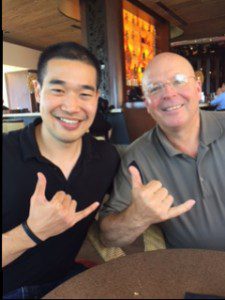Church in the trees or church of the trees? Image credit.
I read this week a leader or two who were critical of the women who qualified as Rangers, and was frankly a combination of amazement and disgusted. They made it on their own, and I wanted to ask the critics to prove they could accomplish what these women did …
The 61-day-long Ranger course is among the most intense and demanding in the military. Its participants are expected to operate on limited food and sleep, facing tests of physical endurance, skill and combat in woods, on mountains and in swamps.
The first phase alone demands 49 push-ups, 59 sit-ups, a five-mile run in 40 minutes, a combat survival swim test and a 12-mile road march that must be completed in three hours while the soldier carries dozens of pounds of gear.
Of the 20 women who qualified, only Griest, Haver and a third woman made it to the second phase.
Later segments included parachute jumps and helicopter assaults, mountaineering in northern Georgia’s Chattahoochee National Forest and waterborne operations in the streams and swamps in Florida. Students are graded on how they perform on dozens of simulated combat patrols, by instructors and fellow students.
While other women struggled, Griest and Haver kept up with their male counterparts and occasionally did better. On July 14, Griest and Haver were required to scale about 60 feet of sheer rock wall on Mount Yonah, a peak in northern Georgia. As others struggled, Griest — who will be promoted to captain Friday — moved steadily up the surface at a pace that eclipsed some of the male Ranger students toiling alongside her.
So, how did they do it? How did those old homes keep their families reasonably cool without air conditioning? This site explains.
The modern air conditioner was invented only in the 1920s, and it didn’t become a common home feature until the latter half of the 20th century.
But, while some of us might wonder how our grandparents survived hot and steamy summers, the fact is those older homes had a few tricks up their sleeves. They were designed and built with features to help them stay cool without AC.
Mary Wheeler Schap is a registered architect who designs and restores historic buildings to their former glory in Cincinnati, Ohio. She offered this expert insight into the features that made older homes livable in the heat.
David Roseberry reflects on the Anglican sense of family in light of the visit of Pope Francis:
Next month, the Pope convenes The World Meeting of Families in Philidelphia, the City of Brotherly Love. Well over a million people are expected in attendance. It’s a big stage…but the subject of the gathering is much larger than massive crowd anticipated, but also infinitely smaller: The Family. The conference calls the family, “the sanctuary of love and life”.
There will be more than a few Anglicans in attendance… to observe, speak, and participate. These leaders, and others, can help our own Anglican movement understand and celebrate what God has done in the human family. Here are a few thoughts of my own…
Here’s a stark illustration of Europe’s migration crisis: The Slovakian government recently announced that it would help share the burden of the influx of tens of thousands of migrants into Europe by taking in 200 Syrian refugees. That’s a small number, but it was made all the more glaring by another stipulation — these refugees had to be Christian.
“In Slovakia, we don’t have mosques,” an Interior Ministry spokesman toldthe Wall Street Journal. Therefore, the official said, “we only want to choose the Christians.”
[Syrian war creates more than 4 million refugees, U.N. says]
International organizations and humanitarian groups have in recent months sounded a warning on the gravity of the refugee crisis. Last month, the United Nations announced that the Syrian civil war had forced more than 4 million Syrians to flee their country. Hundreds of thousands have attempted to find sanctuary in Europe, many braving perilous crossings over the Mediterranean.
Hillary Clinton meets with Black Lives Matter leaders and expresses her systemic approach to problems:
The 2016 candidate even gave suggestions to the activists, telling them that without a concrete plan their movement will get nothing but “lip service from as many white people as you can pack into Yankee Stadium and a million more like it.”
“Look, I don’t believe you change hearts,” Clinton said, arguing that the movement can’t change deep seated racism. “I believe you change laws, you change allocation of resources, you change the way systems operate. You’re not going to change every heart. You’re not. But at the end of the day, we could do a whole lot to change some hearts and change some systems and create more opportunities for people who deserve to have them, to live up to their own God-given potential.”
Clinton met with the Black Lives Matter members on Aug. 11 after the group of activists were not allowed into the presidential candidate’s forum on substance abuse. The protesters showed up shortly before the event started and, according to the Clinton campaign, were not allowed into the main event because the room has been shut down by the local fire marshal. A Secret Service agent told CNN at the time that they had also closed the door on any more people coming into the event.
[This is exactly why the focus for Christians ought to be on the local church forming a new kind of society. What Hillary seems to be offering is a curbing of racism but she knows it’s a matter of the heart.]
The Tooth Fairy story:
The going rate for a tooth under the pillow just isn’t what it used to be.
American children are getting an average of $3.19 for a lost tooth this year, according to Visa’s annual tooth fairy survey. That’s a decrease of almost a quarter from last year, making 2015 the second year in a row the tooth fairy has left less money under kids’ pillows.
Nearly a third of survey respondents (a.k.a. parents) said the tooth fairy leaves $1 a tooth, the most popular amount. Twenty percent said the tooth fairy leaves $5. Five percent of households said the rate for a lost tooth is $20 or more.
And it seems dads are more indulgent, leaving $3.63 on average vs. $2.87 for moms.
Kids in the Midwest get an average of $3.13, higher than children in the West and South but less than in the Northeast.
In 1985, The New York Times published a snippet of comforting news for self-conscious solo eaters. “Dining alone,” the newspaper reassured readers, “is no longer viewed as odd.” At the time, eating spaghetti and meatballs by yourself wasn’t exactly the norm. A second article, which ran only seven months later in the Times, chronicled the stigma of solo dinners.
Thirty years later, thanks to a range of social and cultural trends, eating alone has become less of an occasional exercise than a fact of life. Nearly half of all meals and snacks are now eaten in solitude, according to a new report by industry trade association the Food Marketing Institute. The frequency varies by meal — people are more likely to eat breakfast by themselves than lunch or dinner — but the popularity of solo dining is, no doubt, on the rise, and has been for some time.
“Even the foods that people are gravitating towards when snacking are the kinds we tend to have by ourselves,” said Darren Seifer, an industry analyst at market-research firm NPD Group.
“Throw out the textbooks” and “missing link” are words rarely heard anymore in science, but that’s what researchers around the world are saying about the recent discovery of microscopic lymphatic vessels connecting the brain to the immune system.
That physical link was long thought absent, confounding scientists who study neurological disorders with an immune component. The vessels were found in mice, by accident, by University of Virginia researchers who published their results in Nature. If confirmed in humans, experts say, the discovery could have profound implications for a range of conditions including chronic fatigue syndrome, autism, multiple sclerosis and Alzheimer’s disease.
Lymphatic vessels, which piggyback on blood vessels, distribute immune cells to tissues to fight infection and carry fluid away from tissues to dispose of cellular waste. This complex drainage system has been found in nearly every part of the human body but not, until now, in the brain.
“No one knew there were those ‘pipes’ in there that could take out the brain’s trash,” said Jonathan Kipnis, director of the university’s Center for Brain Immunology and Glia and the study’s senior author. “This is a huge leap in defining the lymphatic vessel system.”
It’s the hummingbird season around our home, so this story struck a chord with Kris and me:
Thanks to a new study, we finally know how hummingbird tongues work.
Until now, the general consensus was that hummingbirds used capillary action to sip tiny bursts of nectar. Capillary action is a force you can observe by putting a long, thin tube in a glass of water: The water will travel up through the narrow space without any suction. Scientists thought that the long, narrow grooves they saw on hummingbird tongues accomplished the same feat.
In a study published Wednesday in the journal Proceedings of the Royal Society B: Biological Sciences, researchers uncovered the truth: Their tongues work like tiny mechanical pumps….
The grooves in the hummingbird tongue don’t reach the throat, so the bird cannot use them as tiny straws. For this reason, instead of using vacuum to generate suction – imagine drinking lemonade out of a straw – the system works like a tiny pump, powered by the springiness of the tongue. The bird squashes the tongue flat, and when it springs open, this expansion rapidly pulls the nectar into the grooves in its tongue. It turns out it’s elastic energy – potential mechanical energy stored by the flattening of the tongue – that lets hummingbirds collect nectar much faster than if they relied on capillarity.



















